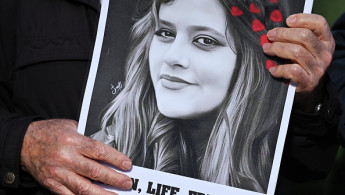Mahsa Amini’s cousin: Her family urges an international court to investigate her death
Mahsa Amini, a 22-year-old Iranian-Kurdish woman from the city of Saqqez, was arrested by morality police in Tehran for allegedly wearing her headscarf in an 'improper' manner. She died in police custody on 16 September, sparking off nationwide demonstrations.
Gunshots rang out as Iranian security forces confronted protests on Wednesday in a crackdown that rights groups say has cost at least 108 lives, many of whom were children.
Mortezaei is Mahsa Amini's cousin and is a peshmerga in the Kurdistan's Organization of the Communist Party of Iran (Komala), based in the Iraqi Kurdistan region. He said that Amini, whose Kurdish name is Zhina or Jina, was with her brother visiting relatives in Tehran. As they came out from the Shahid Haghani Metro Station, the Iranian morality police arrested her on claims that her hijab was 'improper'.
"Amini's brother, Ashkan, confronted Iran's oppressive forces, hence [the police] beat both of them and forced her into a police van. People on board the van told us that the Iranian police verbally abused and beat Zhina to the police station," Mortezaei told The New Arab. "After an hour at the police station, an ambulance arrived, and it took another half an hour to transfer Zhina to a nearby hospital. But it was too late. She was in a coma."
Mortezaei clarified that Amini's family still are unaware of what happened at the police station, and Iranian authorities have not released surveillance footage of her while in police custody.
"Eyewitnesses have told us that police have tortured Zhina during interrogations with her, causing her to die later," Mortezaei said.
According to Mortezaei, that Iranian police confiscated Zhina's mobile phone and did not allow her to make phone calls with her family members while in custody.
The official Iranian narrative on Zhina's death states that she had died of a heart attack due to previous medical problems. To deny the claim that she was tortured while in custody, parts of a surveillance camera recording which depicts Zhina fainting were published.
But Amini's father told the pro-reform Emtedad news website that his daughter was fit and had no health problems.
"Even in the CCTV video published by the Iranian regime, it is clearly seen that Zhina's clothes have no problem and totally consistent with Iran's attire regulations," Amini's cousin remarked.
Zhina's relatives and family members have filed a legal case to the Iranian judiciary to disclose the reality of Zhina's death, Amini's cousin said, adding that he believes, however, that Iran's courts cannot independently judge the case.
"Iran's judiciary is not independent, it is being monitored by Iran's oppression forces, namely the ministry of intelligence," Mortezaei said. "We urge the international community to settle Zhina's case in an international court of human rights."
"Wide protests across Iran, especially in the Iranian Kurdistan [west of Iran], stem from the rage by Iranian peoples against 43 years of the Islamic regime's system. Since 1979 the autocrats in the Islamic Republic of Iran have been curbing, killing and imprisoning its opponents and denying freedom to its people," Mortezaei said of the ongoing protests that have spread across Iran.
"Zhina's death set the entire country afire. Currently, Iranian women are the pioneers of this Iranian revolution. Many Iranian women, before and after the death of Zhina, have been the victims of Iran's oppression; people are angry and want to topple this regime," he added.
Regarding the impact of the protests on Iran's future, he opined, "The difference between the current protests in Iran with the previous ones is that the Iranian people have identified their main aim for the protests, which is toppling the Islamic regime. The previous protests were only temporary anger, silenced after a few days. I predict the protests will lead to the collapse of the Islamic republic soon and bring about a new regime of ruling where the people of Iran live in freedom."






 Follow the Middle East's top stories in English at The New Arab on Google News
Follow the Middle East's top stories in English at The New Arab on Google News


